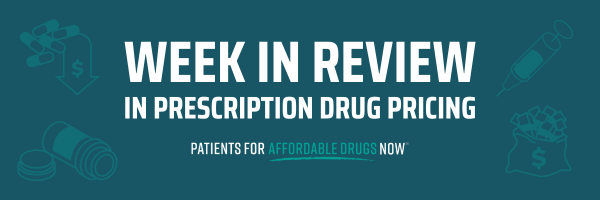
Congress may be in recess, but we’ll be busy writing letters to our Senators to pass bipartisan drug price reforms that boost competition and curb patent abuse!
Welcome to the Week in Review.
1. Senate Takes on PBM and Patent Reforms
- Busy week on the hill before recess! In a near-unanimous vote, the Senate Finance Committee advanced bipartisan reforms to increase transparency and accountability of Pharmacy Benefit Manager (PBM) practices. “The move adds to the flurry of activity in both chambers on PBMs, highlighting the interest in both parties in getting changes across the finish line,” Axios reported. In the Senate Judiciary Subcommittee on Intellectual Property, Senator Peter Welch shed light on Big Pharma’s abuse of the patent system. “When you have a patent system that can be abused by the patent holders, and they can go beyond the period of exclusivity, it’s brutal on the cost of health care for American employers, to taxpayers, and to private payers,” Welch explained. He used the example of Humira, which has brought AbbVie billions of dollars in profit during its reign as the world’s best-selling drug by obtaining 165 patents on the drug — barring any competition from coming to market. AbbVie’s Humira also illustrates how both patent abuses and PBMs play a role in preventing competition. When competitors finally come to market, PBMs often stand in the way of patients obtaining the more affordable options. PBMs “direct the prescription flow of patients,” Clear Health Costs summarized. “[PBM]s channel patients into higher-priced drugs and away from less expensive drugs. That’s how they get paid more.” Senators, let’s reform our rigged patent system and PBM practices – patients are waiting! — (Axios, WCAX, Clear Health Costs)
2. Debunking Pharma Doublespeak
- Big Pharma will stop at nothing to preserve its bottom line and exploitative pricing power. New lawsuits from drug companies are “throwing the kitchen sink” in a desperate attempt to stop Medicare from negotiating lower prices for patients, terrified their profits will suffer under the new law. But pharma earning reports tell a different story. The five largest drug companies reported combined earnings of $81.9 billion in 2022, an increase of $8 billion from 2021, according to new analysis by Accountable.US. Given these billions of dollars in profit made last year, drug company’s claims about damage to their research and development (R&D) expenses sure seem pretty unconvincing. “The drug companies are putting their profits ahead of the affordability of drugs for millions of Americans on Medicare,” wrote Al Norman of Massachusetts. Thankfully, the Medicare negotiation program will rein in high drug prices and increase access to innovative medicines by considering factors like a drug’s clinical benefit. “The Inflation Reduction Act might incentivize companies to focus more heavily on breakthrough therapies, instead of so-called me-too drugs,” Harvard Professor Ameet Sarpatwari told The New York Times. Big Pharma’s bogus lawsuits and lies about the new law don’t stand a chance – Medicare negotiation will bring relief to patients who have faced unjustified price hikes year after year. — (The New York Times, The Lancet, The Hill, The Fifty Plus Life, Common Dreams)
3. The Inflation Reduction Act: More Savings For Patients
- Patients are already feeling relief from the Inflation Reduction Act and will continue to see savings from the soon-to-be implemented provisions. On the Senate floor, Majority Leader Chuck Schumer celebrated some of the historic reforms passed last year: “Because of the IRA, vaccines are free for Medicare beneficiaries, and a cap on out-of-pocket drug spending – no senior will pay more than $2,000 a year for drugs – is coming very soon.” A new study published in JAMA found that people on Medicare have filled more insulin prescriptions since the historic drug price law was passed in 2022. The study noted that the $35 monthly insulin copay cap “meaningfully reduced” the number of people on Medicare who were rationing insulin due to cost. For patients like Lawrence, who paid more than $100 per bottle of insulin before 2023, the insulin copay cap brings significant savings. Medicare negotiation is also expected to lower drug prices for patients and reduce the federal deficit by billions of dollars. The negotiation process is “turning the tables on drugmakers,” who set unjustly high drug prices, Leslie Walker discussed on the Tradeoffs podcast. At a town hall, Senator Elizabeth Warren explainedMedicare negotiation, which starts with just ten negotiated drugs for the first round, as the “crack in the wall” of Big Pharma monopoly power. This is just the beginning – we won’t stop until no walls exist between patients and their medications. — (Senate Democrats, Spectrum News 1, Augusta Free Press, Tradeoffs, The Berkshire Eagle)
Have a great weekend!
